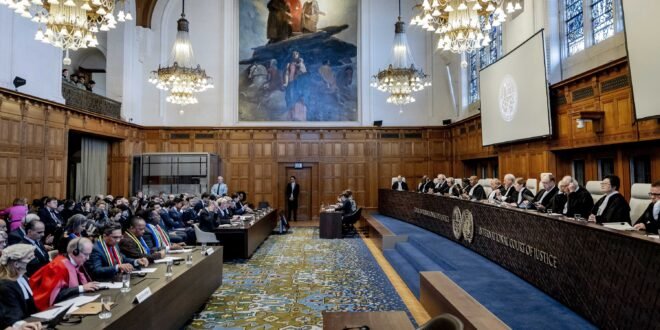A Landmark Ruling on Climate Change and Human Health
Legal experts around the world are currently analyzing the implications of a groundbreaking advisory opinion issued by the International Court of Justice (ICJ) regarding climate change. The ruling emphasizes that states have a responsibility to prevent significant environmental harm, marking a pivotal moment in international law.
The court highlighted that nations must collaborate globally to mitigate the effects of climate change. Although it did not explicitly connect climate change with the health crisis, it acknowledged the health dimension through the “right to a clean, healthy, and sustainable environment.” Advocacy groups focused on health-related aspects of climate change argue that this opinion affirms the notion of the climate crisis as a health crisis.
Yamide Dagnet, Senior Vice President at the Natural Resources Defense Council (NRDC), outlined three key points from the advisory opinion. All countries are obligated to address climate change under international and customary laws, beyond their commitments under the Paris Agreement. The opinion also provides legal grounds for seeking reparations from major emitters, including the fossil fuel industry. Additionally, it ensures that small island nations can retain their statehood even if their land disappears due to rising sea levels, as illustrated by the Rising Nation Initiative and the Global Centre for Climate Mobility.
Dr. Jeni Miller, Executive Director at the Global Climate and Health Alliance, emphasized the historic significance of the ruling. She stated that the court confirmed the climate crisis is indeed a health crisis and that failure to act is a failure to protect life. “This ruling confirms that governments and corporations have a legal duty to prevent further harm, uphold the right to health, and safeguard future generations,” she said.
The ICJ delivered its ruling on July 23 in response to a United Nations General Assembly resolution led by Vanuatu, a small island nation in the Pacific. Vanuatu sought an advisory opinion on the obligations of states to address climate change and its legal consequences. Following a lengthy hearing in December, the ICJ provided its first opinion on climate change. President of the International Court of Justice Judge Yuji Iwasawa noted that the case was unlike any previous one, addressing an existential issue of planetary proportions that threatens all forms of life and the health of the planet.
A Pivotal Moment for Climate and Health Justice
In addressing planetary health, the court outlined the impact of human-induced climate change on growing health concerns. During the hearing, Dr. Tedros Adhanom Ghebreyesus testified to the court, stating that climate change is fundamentally a health crisis. “The climate crisis is among the most significant health challenges facing humanity today,” he remarked during his testimony.
Experts believe that health workers and advocates now have strong legal backing to demand bold, science-based climate action rooted in justice. They are reviewing the court’s opinion to make a more nuanced analysis, noting that it marks a pivotal moment for climate and health justice. Shweta Narayan, Campaign lead at the Global Climate and Health Alliance, said the ruling reaffirms the urgency of comprehensive, rights-based action that addresses both immediate health harms and the root causes of the crisis.
“This represents a major step forward in reframing the climate crisis as fundamentally a health crisis and in mobilizing the legal, scientific, and political tools needed to respond,” she added. “This ruling strengthens the moral mandate to place health at the center of climate negotiations, including in adaptation, loss and damage, and climate finance frameworks.”
The court used a human rights approach to address the health aspect of climate change in its ruling. Vanuatu, which led the campaign for the opinion, welcomed the ruling in a statement. “The opinion integrates international human rights law, identifying the rights to life, health, an adequate standard of living, and the right to a clean, healthy, and sustainable environment as directly threatened by climate change,” the Vanuatu Climate Justice Program said. “It affirms that environmental protection is a precondition for their enjoyment.”
Dagnet emphasized the power of activism, highlighting that the students of Vanuatu dared to dream big and challenge the status quo, leading to what could be one of the most important milestones in the global climate fight. “I am thrilled at the landmark decision to validate some of the most ambitious climate priorities championed by vulnerable states over the last 50 years.”
 Info Malang Raya Its All About World News
Info Malang Raya Its All About World News




